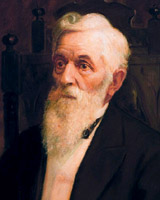|
Lorenzo Snow devoted his life to his religion. A colonizer, missionary, educator, legislator, cultural arts enthusiast, husband, and father, Snow originally planned a career in the military, but his conversion to the Mormon faith refocused his plans. For fifty-two years he was an apostle of the LDS Church and served as president of the more than 250,000 members at the turn of the century.
Born 3 April 1814 in Mantua, Portage County, Ohio, Snow was the fourth of seven children. As the eldest son, he assumed much responsibility for the family farm. The Snows were hard-working settlers, well-to-do by local standards. Though the family was active in the local Baptist congregation, their home was often a forum for other religious teachings. Lorenzo loved to read; he was educated in local schools until he left for Oberlin College, a Presbyterian school, where he distinguished himself in his studies. He left Oberlin in 1836 to travel to Kirtland, Ohio, where he investigated and soon was converted to the Mormon Church, a new religion embraced by his sister Eliza Roxcy Snow.
He led a party of pioneers across the Great Plains and was called as one of the church's twelve apostles on 12 February 1849, shortly after settling in the Salt Lake valley. Over the years, he served five proselyting missions, in Ohio, Missouri, England, Italy, and northern Idaho. Because of his love for pomp, ceremony, cultural activities, and grand events he was always organizing plays, recitations, singing, and parades wherever he lived.
A significant force in colonizing northern Utah and one of its representatives in the territorial legislature, Snow presided over the settlement of Box Elder County for more than twenty years. He named his community Brigham City after his close friend, LDS Church president Brigham Young. When first assigned to the obscure settlement, he described it as "unprosperous and more extensively patronized as a receptacle for bed bugs than for an assemblage of Saints." But within four years of Snow's implementation of a communal economic system, or united order, Brigham City became one of the most progressive and prosperous settlements in Utah.
He traveled to Hawaii and Israel on church business; and he presented England's Queen Victoria and Prince Albert with copies of the Book of Mormon, receiving in return their autographs, which he cherished for life. At age seventy-two Snow was sentenced to a prison term for practicing polygamy. In prison he taught classes in reading, writing, mathematics, and bookkeeping during his one-year term. In 1893 he was named the first president of the Salt Lake Temple.
Lorenzo Snow was sustained LDS Church president on 13 September 1898. With the church in severe financial circumstances, Snow reaffirmed the members' responsibility to pay a ten-percent tithe. The fifth LDS prophet, he was the last of those who were personally taught the church's principles by its founder, Joseph Smith. He died on 10 October 1901 at the age of eighty-seven.
See: Thomas C. Romney, The Life of Lorenzo Snow (1955); Preston Nibley, The Presidents of the Church (1974); Eliza R. Snow Smith, Biography and Family Record of Lorenzo Snow (1884); Leonard J. Arrington, Great Basin Kingdom (1966); Clyde J. Williams, ed., The Teachings of Lorenzo Snow (1984); Francis M. Gibbons, Lorenzo Snow: Spiritual Giant, Prophet of God (1982); and Maureen Ursenbach Beecher, "Leonara, Eliza, and Lorenzo," The Ensign 10 (June 1980).
|


